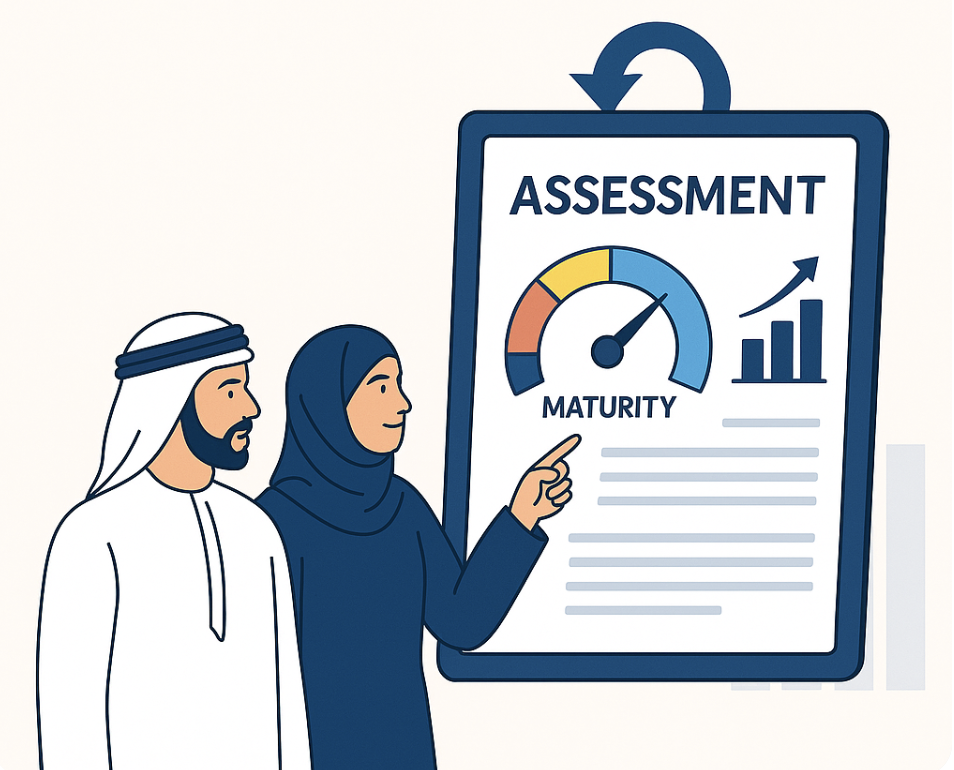AI Transformation in the UAE: From Hype to Real Business Impact
Introduction
Artificial Intelligence (AI) is no longer a futuristic concept for the UAE—it is a present-day reality reshaping industries, governments, and societies. From Dubai’s autonomous transportation initiatives to Abu Dhabi’s ambitious AI-powered healthcare advancements, AI has become the linchpin of the UAE’s national innovation strategy. This blog explores how the UAE and the broader Middle East are moving beyond the AI hype cycle and achieving tangible, transformational business outcomes.
The UAE’s Strategic Focus on AI
The UAE made history as the first country to appoint a Minister of State for Artificial Intelligence in 2017. Since then, the UAE Artificial Intelligence Strategy 2031 has set an aggressive roadmap to position the nation as a global AI leader. Core objectives include improving government performance, driving economic growth, and enhancing quality of life through AI.
Key highlights of UAE’s AI focus include:
- AI in Government Services: Smart government initiatives aim to cut costs by up to 50% while improving public services.
- AI in Healthcare: AI is being used in early disease detection, robotic surgeries, and predictive analytics in hospitals like Cleveland Clinic Abu Dhabi.
- AI in Energy: ADNOC uses AI to optimise oil production, reduce environmental impact, and drive sustainability.
- AI in Education: UAE universities are integrating AI curriculums, while the Ministry of Education uses AI to personalise learning.
This multi-sector focus ensures that AI adoption isn’t isolated but is a holistic national priority.
Moving from AI Hype to Business Value
Globally, businesses have faced challenges transitioning from AI experimentation to scalable deployment. In the UAE, however, unique factors like government backing, private sector enthusiasm, and advanced infrastructure have accelerated this journey.
Key drivers making AI a real business asset in the UAE include:
- Regulatory Support: Initiatives like the UAE National AI Strategy provide a clear governance framework.
- Mega-Projects as Testbeds: Expo City Dubai and NEOM (in neighbouring Saudi Arabia) serve as live AI innovation hubs.
- High Digital Readiness: With world-leading smartphone penetration and 5G rollout, UAE organisations have a strong digital foundation to build AI applications.
AI Success Stories in UAE Businesses
Many UAE-based organisations have moved beyond pilot projects into enterprise-wide AI deployments:
- Emirates NBD uses AI-powered chatbots handling millions of customer interactions efficiently.
- Careem, the ride-hailing app, deploys AI for dynamic pricing and demand prediction, improving operational agility.
- DP World incorporates AI in port logistics, reducing processing times and improving cargo tracking accuracy.
These examples demonstrate that AI in the UAE is delivering measurable ROI across customer service, operational efficiency, and strategic decision-making.
Emerging AI Trends in the UAE and Middle East
As we move into the second half of 2025 and beyond, several trends are shaping the AI landscape in the UAE and GCC:
- Generative AI in Business Processes: Companies in Dubai and Abu Dhabi are exploring Generative AI for marketing automation, report generation, and customer engagement.
- AI in Cybersecurity: The rise of digital businesses in the UAE has led to AI being adopted to detect and mitigate cyber threats in real time.
- AI in Sustainability Initiatives: The UAE’s Net Zero 2050 ambition is driving AI adoption in energy management, smart cities, and climate risk prediction.
- AI in Retail and E-Commerce: Personalised shopping experiences, demand forecasting, and AI-powered customer service are revolutionising the UAE retail sector.
AI and Organisational Agility: The Perfect Combination
AI is not just about technology—it’s about enabling business agility. UAE organisations adopting AI report:
- Faster Decision Making: AI-driven analytics cut time-to-insight dramatically.
- Increased Adaptability: AI tools allow companies to pivot in response to market changes.
- Enhanced Innovation: Automating routine tasks frees up human capital for innovation.
Agility Arabia helps organisations unlock these benefits by integrating AI adoption with agile transformation frameworks, ensuring AI drives business impact, not just IT change.
Challenges in AI Adoption in the Middle East
Despite the progress, challenges remain:
- Talent Gaps: There is high demand but low supply of AI specialists in the UAE.
- Data Governance: Data privacy regulations are evolving, and businesses must stay compliant.
- Scaling AI: Moving from pilot to scale requires robust change management and leadership buy-in.
Agility Arabia works with clients to overcome these hurdles through AI talent strategies, change management programs, and AI governance frameworks tailored for UAE regulatory environments.
Future Outlook: What’s Next for AI in the UAE?
The next frontier includes:
- AI-Powered Smart Cities: Dubai and Abu Dhabi are investing in AI to manage traffic, utilities, and public safety.
- AI in Financial Services: Open banking and AI-powered credit scoring are transforming UAE banking.
- Cross-Border AI Innovation: Collaboration between UAE, Saudi Arabia, and Qatar is fostering regional AI ecosystems.
With initiatives like Dubai’s D33 Economic Agenda and Abu Dhabi’s Hub71 AI start-up hub, the UAE is set to become not just a user but a global exporter of AI innovation.
Conclusion: From AI Pilots to Business Agility
The UAE’s commitment to AI is delivering results far beyond experimentation. Companies across industries are seeing real business impact, from customer experience improvements to cost savings and accelerated innovation.
To thrive in the UAE’s high-speed economy, businesses must combine AI adoption with organisational agility. At Agility Arabia, we help UAE and Middle Eastern organisations move beyond the AI hype, ensuring AI is aligned with strategy, scaled effectively, and delivers measurable business value.
Contact Agility Arabia today to discover how your organisation can lead the next wave of AI transformation in the UAE and Middle East.




